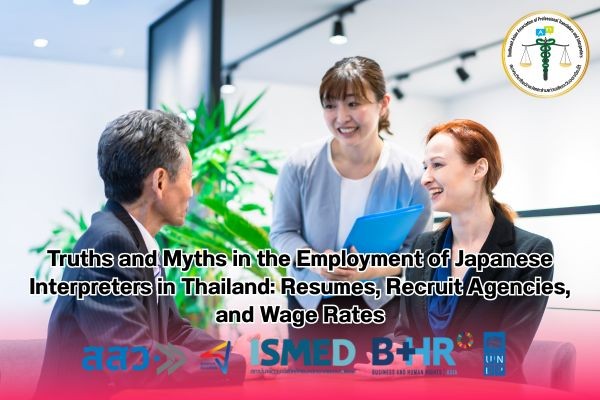Truths and Myths in the Employment of Japanese Interpreters in Thailand: Resumes, Recruit Agencies, and Wage Rates
18 August 2025, Bangkok – The profession of Japanese interpreters in Thailand has long been in demand across industrial sectors and Japanese-affiliated companies. Yet, it is also fraught with issues that are rarely disclosed to the public, including silent dismissal, the use of dishonest strategies in resumes, and myths surrounding wage ratessuch as the claim that JLPT N3 interpreters can earn 80,000 THB. This article aims to describe the labor market structure for Japanese interpreters in Thailand, analyze factors that contribute to these problems, and highlight professional ethics issues that warrant closer attention.
Introduction
Over the past decade, Japanese interpreting has become a highly attractive profession in Thailand, especially among graduates of Japanese studies or those with work and training experience in Japan. However, unlike conventional labor markets, interpreting employment is characterized by dependence on recruit agencies, short-term contract employment, and permanent positions. Each form of employment has implications for job security and career advancement (Ikeuchi, 2020; Nishii, 2021).
The Phenomenon of Silent Dismissal
One of the defining characteristics of the interpreter labor market is silent dismissal. Rather than formal termination, dismissals often take the form of “non-renewal” or “replacement of interpreters” through recruitment agencies. Clients or host companies may request refunds or replacements directly, which means such dismissals are not legally considered “firings” (Taweesak, 2020). As a result, interpreters frequently lose positions quietly, without news coverage or reporting to their universities of origin.
Resume Misrepresentation and Its Consequences
Insider accounts from the profession reveal that some candidates—particularly fresh graduates with JLPT N3—commonly exaggerate their experience. Examples include claiming “8 months of interpreting experience” or stating that they “worked for multinational corporations,” when in fact the work was through outsourcing agencies. Such practices align with the theory of impression management, where applicants tailor their image to employer expectations (Bolino et al., 2016). While this may secure short-term employment, failure to meet the expectations claimed often results in immediate dismissal and reputational harm within the close-knit professional community.
The Myth of High Wage Rates
A widely circulated belief suggests that JLPT N3 interpreters can earn up to 80,000 THB per month. In reality, such cases are outliers, typically linked to temporary contracts in specific industrial zones (e.g., Lamphun Industrial Estate), rather than being the industry standard. Interpreter wages are largely determined by multiple factors, including JLPT proficiency level, work experience, and form of employment (contract vs. permanent) (JETRO, 2022). For fresh graduates at N3 level, actual wages are significantly lower. The myth of inflated wages encourages unrealistic expectations and incentivizes candidates to embellish resumes to compete.
Lessons on Professional Ethics
Despite competitive pressures, resume misrepresentation constitutes a violation of professional interpreter ethics. In contexts such as court, healthcare, or diplomacy, dishonesty directly undermines justice and human welfare. International professional bodies, such as AIIC, clearly prohibit false professional claims as breaches of ethical conduct (AIIC, 2020). If the practice of “lying first and testing one’s luck later” becomes normalized, it threatens the long-term credibility of the profession as a whole.
Conclusion
This article has demonstrated that the Japanese interpreter labor market in Thailand is shaped by silent dismissals via recruitment agencies, resume misrepresentation, and myths of inflated wages. These phenomena underscore the urgent need for stricter professional standards, greater education of students and novice interpreters about ethics, and fairer monitoring systems that protect both clients and interpreters. Only by addressing these challenges can the profession maintain credibility in the long term.
References
- AIIC. (2020). Code of professional ethics. International Association of Conference Interpreters. Retrieved from https://aiic.org
- Bolino, M. C., Long, D., & Turnley, W. H. (2016). Impression management in organizations: Critical questions, answers, and areas for future research.
- Annual Review of Organizational Psychology and Organizational Behavior, 3(1), 377–406. https://doi.org/10.1146/annurev-orgpsych-041015-062337
- Ikeuchi, S. (2020). Labor market dynamics of interpreters in East Asia. Journal of Asian Business Studies, 14(2), 123–139.
- JETRO. (2022). Survey on Japanese companies in Asia and Oceania. Japan External Trade Organization.
- Nishii, A. (2021). Employment practices of interpreters in Japanese-affiliated companies abroad. Interpreting Studies, 21(1), 55–74.
- Taweesak, S. (2020). Contract labor and labor rights in Thailand. Bangkok: Thammasat University Press.
About Certified Translators, Translation Certification Providers, and Certified Interpreters of SEAProTI
The Southeast Asian Association of Professional Translators and Interpreters (SEAProTI) has announced the qualifications and requirements for individuals registered as Certified Translators, Translation Certification Providers, and Certified Interpreters of the Association, as stated in Chapter 9 and Chapter 10 of the Royal Gazette of the Secretariat of the Cabinet, Office of the Prime Minister of the Kingdom of Thailand, dated July 25, 2024, Volume 141, Part 66 Ngor, p. 100. Full details can be accessed at: The Royal Thai Government Gazette
SEAProTI is the first professional association in Thailand and Southeast Asia to establish a certification system for Certified Translators, Translation Certification Providers, and Certified Interpreters.
Head Office: Baan Ratchakru Building, Room 402, No. 33, Soi Phahonyothin 5, Phahonyothin Road, Phayathai District, Bangkok 10400
Email: hello@seaproti.com Telephone: (+66) 2-114-3128 (Business hours: Monday–Friday, 9:00 a.m.–5:00 p.m.)
ความจริงและมายาคติของการจ้างล่ามญี่ปุ่นในประเทศไทย: เรซูเม่ รีครูท และเรทเงินเดือน
18 สิงหาคม 2568, กรุงเทพมหานคร – อาชีพล่ามภาษาญี่ปุ่นในประเทศไทยเป็นอาชีพที่มีความต้องการสูงจากภาคอุตสาหกรรมและบริษัทญี่ปุ่น แต่ในขณะเดียวกันกลับเต็มไปด้วยปัญหาที่ไม่ถูกเปิดเผยต่อสาธารณะ ทั้งกรณีการเลิกจ้างเงียบ (silent dismissal) การใช้กลยุทธ์บิดเบือนหรือโกหกในเรซูเม่ และความเชื่อผิด ๆ เกี่ยวกับอัตราค่าจ้าง โดยเฉพาะเรทสูงเกินจริง เช่น 80,000 บาทสำหรับผู้มีระดับภาษาญี่ปุ่นเพียง N3 บทความนี้มีจุดมุ่งหมายเพื่ออธิบายสภาพตลาดแรงงานล่ามญี่ปุ่นในไทย วิเคราะห์ปัจจัยที่ทำให้เกิดปัญหาดังกล่าว และสะท้อนประเด็นด้านจริยธรรมวิชาชีพ (professional ethics) ที่ควรถูกตระหนัก
บทนำ
ในรอบทศวรรษที่ผ่านมา ล่ามภาษาญี่ปุ่นถือเป็นหนึ่งในอาชีพที่ได้รับความสนใจมากในประเทศไทย โดยเฉพาะผู้ที่จบจากสาขาภาษาญี่ปุ่นหรือมีประสบการณ์ทำงานและฝึกงานในประเทศญี่ปุ่น อย่างไรก็ตาม แม้จะเป็นตลาดแรงงานที่มีมูลค่าสูง แต่กลับมีลักษณะการที่แตกต่างจากแรงงานทั่วไป ทั้งการจ้างผ่านบริษัทรีครูท (recruit agency) การจ้างสัญญาระยะสั้น (contract) และการจ้างประจำ (permanent employment) ซึ่งแต่ละแบบมีผลกระทบต่อความมั่นคงในการทำงานและโอกาสการเลื่อนตำแหน่ง (Ikeuchi, 2020; Nishii, 2021)
ปรากฏการณ์การเลิกจ้างเงียบ (Silent Dismissal)
หนึ่งในลักษณะสำคัญของตลาดล่ามคือการเลิกจ้างโดยไม่มีการประกาศอย่างเป็นทางการ โดยส่วนใหญ่จะเกิดในลักษณะ “ไม่ต่อสัญญา” หรือ “เปลี่ยนตัวล่าม” ผ่านระบบรีครูท ลูกค้าหรือบริษัทปลายทางสามารถเคลมเงินคืนหรือขอหาล่ามใหม่ได้โดยตรง ทำให้การเลิกจ้างไม่ถูกนับเป็น “การไล่ออก” ในเชิงกฎหมายแรงงาน (ทวีศักดิ์, 2563) ความเงียบเช่นนี้สะท้อนว่า ล่ามจำนวนมากอาจพ้นจากงานโดยไม่เป็นข่าว และไม่มีการส่งข้อมูลต่อไปยังสถาบันการศึกษาต้นสังกัด
การโกหกในเรซูเม่และผลกระทบ
บทสนทนาภายในวงการล่ามชี้ให้เห็นว่าผู้สมัครบางราย โดยเฉพาะผู้ที่มีระดับภาษาญี่ปุ่น N3 เพิ่งจบใหม่ มักเพิ่มข้อมูลเกินจริง เช่น อ้างว่ามีประสบการณ์ล่าม 8 เดือน หรือเคยทำงานให้กับบริษัทข้ามชาติ ทั้งที่เป็นงานผ่านเอเจนซี่ การแต่งเรซูเม่ลักษณะนี้สอดคล้องกับทฤษฎี “impression management” ที่ผู้สมัครพยายามปรับภาพลักษณ์ให้เหมาะกับความคาดหวังนายจ้าง (Bolino et al., 2016) แม้วิธีดังกล่าวอาจช่วยให้ได้งานในระยะสั้น แต่หากทำงานจริงไม่ตรงตามที่อ้าง อาจถูกเลิกจ้างอย่างรวดเร็วและเสียเครดิตในวิชาชีพ
มายาคติเรื่องอัตราค่าจ้าง
มีการพูดถึงเรทค่าจ้าง 80,000 บาท สำหรับล่ามญี่ปุ่นระดับ N3 ซึ่งถูกมองว่าเป็น “ข่าวลือ” หรือเป็นกรณีเฉพาะของงานสัญญาจ้างพิเศษในนิคมอุตสาหกรรม (เช่น ลำพูน) มากกว่าจะเป็นมาตรฐานทั่วไป ในความเป็นจริง ค่าจ้างล่ามญี่ปุ่นขึ้นอยู่กับหลายปัจจัย ได้แก่ ระดับภาษาญี่ปุ่น (JLPT), ประสบการณ์การทำงาน, และรูปแบบการ雇用 (contract vs permanent) โดยส่วนใหญ่ N3 ที่เพิ่งจบใหม่จะได้รับเรทต่ำกว่าที่เป็นข่าว (JETRO, 2022) การสร้างมายาคติเรื่องเรทสูงเกินจริง อาจทำให้ผู้สมัครรู้สึกว่าต้อง “แต่งเรซูเม่” เพื่อแข่งขัน
บทเรียนด้านจริยธรรมวิชาชีพ
แม้แรงกดดันทางการแข่งขันจะสูง แต่การบิดเบือนข้อมูลในเรซูเม่ถือเป็น การละเมิดจริยธรรมวิชาชีพล่าม (professional ethics) โดยเฉพาะเมื่อการล่ามเกี่ยวข้องกับบริบทที่มีผลต่อชีวิตมนุษย์ เช่น ศาล การแพทย์ หรือการทูต มาตรฐานของสมาคมล่ามระดับนานาชาติ (เช่น AIIC) กำหนดไว้อย่างชัดเจนว่าการรายงานข้อมูลเท็จถือเป็นการผิดจรรยาบรรณ (AIIC, 2020) หากปล่อยให้แนวปฏิบัติ “โกหกไปก่อนแล้วค่อยวัดดวง” แพร่หลาย ย่อมทำลายความน่าเชื่อถือของอาชีพโดยรวม
สรุป
บทความนี้ได้ชี้ให้เห็นว่าตลาดแรงงานล่ามภาษาญี่ปุ่นในประเทศไทยกำลังเผชิญความท้าทายหลายด้าน ตั้งแต่การเลิกจ้างเงียบผ่านระบบรีครูท การโกหกในเรซูเม่ ไปจนถึงมายาคติเรื่องค่าจ้างสูงเกินจริง ปรากฏการณ์เหล่านี้สะท้อนให้เห็นถึงความจำเป็นในการกำหนดมาตรฐานวิชาชีพที่เข้มงวดขึ้น การให้ความรู้แก่นักศึกษาและล่ามรุ่นใหม่เกี่ยวกับจริยธรรม และการสร้างระบบตรวจสอบที่เป็นธรรมต่อทั้งลูกค้าและล่าม เพื่อปกป้องความน่าเชื่อถือของอาชีพล่ามในระยะยาว
เอกสารอ้างอิง
- AIIC. (2020). Code of professional ethics. International Association of Conference Interpreters. Retrieved from https://aiic.org
- Bolino, M. C., Long, D., & Turnley, W. H. (2016). Impression management in organizations: Critical questions, answers, and areas for future research.
- Annual Review of Organizational Psychology and Organizational Behavior, 3(1), 377–406. https://doi.org/10.1146/annurev-orgpsych-041015-062337
- Ikeuchi, S. (2020). Labor market dynamics of interpreters in East Asia. Journal of Asian Business Studies, 14(2), 123–139.
- JETRO. (2022). Survey on Japanese companies in Asia and Oceania. Japan External Trade Organization.
- Nishii, A. (2021). Employment practices of interpreters in Japanese-affiliated companies abroad. Interpreting Studies, 21(1), 55–74.
- ทวีศักดิ์ ศรีทอง. (2563). แรงงานสัญญาจ้างและสิทธิแรงงานในประเทศไทย. กรุงเทพฯ: สำนักพิมพ์มหาวิทยาลัยธรรมศาสตร์.
เกี่ยวกับนักแปลรับรอง ผู้รับรองการแปล และล่ามรับรองของสมาคมวิชาชีพนักแปลและล่ามแห่งเอเชียตะวันออกเฉียงใต้
สมาคมวิชาชีพนักแปลและล่ามแห่งเอเชียตะวันออกเฉียงใต้ (SEAProTI) ได้ประกาศหลักเกณฑ์และคุณสมบัติผู้ที่ขึ้นทะเบียนเป็น “นักแปลรับรอง (Certified Translators) และผู้รับรองการแปล (Translation Certification Providers) และล่ามรับรอง (Certified Interpreters)” ของสมาคม หมวดที่ 9 และหมวดที่ 10 ในราชกิจจานุเบกษา ของสำนักเลขาธิการคณะรัฐมนตรี ในสำนักนายกรัฐมนตรี แห่งราชอาณาจักรไทย ลงวันที่ 25 ก.ค. 2567 เล่มที่ 141 ตอนที่ 66 ง หน้า 100 อ่านฉบับเต็มได้ที่: นักแปลรับรอง ผู้รับรองการแปล และล่ามรับรอง
*สมาคมวิชาชีพนักแปลและล่ามแห่งเอเชียตะวันออกเฉียงใต้ เป็นสมาคมวิชาชีพแห่งแรกในประเทศไทยและภูมิภาคเอเชียตะวันออกเฉียงใต้ที่มีระบบรับรองนักแปลรับรอง ผู้รับรองการแปล และล่ามรับรอง
สำนักงานใหญ่: อาคารบ้านราชครู เลขที่ 33 ห้อง 402 ซอยพหลโยธิน 5 ถนนพหลโยธิน แขวงพญาไท เขตพญาไท กรุงเทพมหานคร 10400 อีเมล: hello@seaproti.com โทรศัพท์: (+66) 2-114-3128 (เวลาทำการ: วันจันทร์–วันศุกร์ เวลา 9.00–17.00 น.)

























